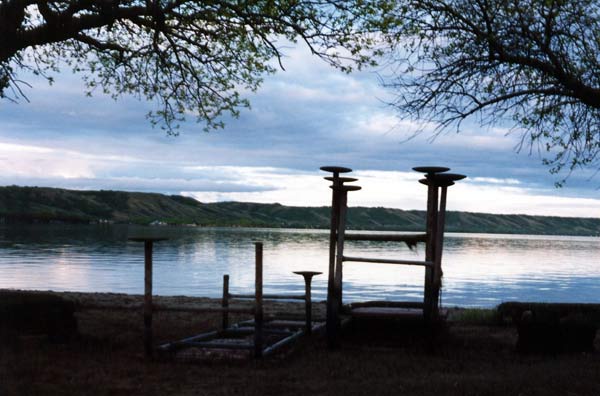The Qu’Appelle, which means “Who is calling?” is a beautiful valley 500 kilometers west of Winnipeg. The river which bears the same name winds gently through, forming along its course eight charming lakes bordered by verdant hills. As early as 1868 Oblate missionaries came there at a location known today as Lebret. There they established a parish, a trade school, and a scholasticate. The name of this valley is intriguing: Qu’Appelle. What is its origin? To know this, one must read the sad and sentimental legend described by the native poet Pauline Johnson, who composed in English, at the end of the Nineteenth Century. Father Aurèle Chalifoux, O.M.I. penned a free and abridged French paraphrase.
“I also, insisted the aged Amerindian, loved her as much as my own life. I had noticed that she was becoming an admirable young woman; I wanted her for my wife. And it was I who really heard that mysterious voice, the voice whose strange history inspired the white men when they gave the name of Qu’Appelle to this magnificent valley.
“One day, she had whispered in my ear: ‘When the Amerindian Summer smiles, come back to the lakes. I will be the first to hear the music of your oar; I will be the first to utter words of loving welcome. And when you return to your homeland, I will follow, happy to be your wife forever.’
“No leaf had yet fallen when, impatient, I left to win this queen of Northern women. I hurried to the head of the lakes to launch my canoe immediately. I never felt the need for sleep or food, my heart and the oar were beating at the same rhythm. And yet, the days were too long, for my liking, until I could say: ‘just one more day and I’ll be with my queen.’
“As I slowed down for a brief moment to dream of my approaching good fortune, I heard a voice tenderly calling my name. Who is calling me thus?’ asked I out loud. No answer. I remained completely immobile so that I could listen better. Then in the melancholy of the nightly wind, I distinctly heard the strange voice a second time. It was a woman’s voice who was avidly searching, one could say, for the soul of her soul in order to hum lovingly a song never yet sung.
“And that voice had certainly pronounced my name. Then I began to shout on all sides the words of the popular expression: ‘Qu’Appelle? Qu’Appelle?’ But only the echo of my voice came back to me, reverberating from the surrounding hills: Qu’Appelle, Qu’Appelle! In the dark night, amid a deep silence, the moon rose from the East like a pale and icy specter.
“Not long after this, my canoe touched land, near the entrance to her wigwam. I noticed a funereal blaze burning on the shore, and heard the lamentations of women and men. Grasping what was going on, it was suddenly as if the light of life had extinguished completely inside of me. No words could describe the pain and sorrow that I felt… And when they led me to the mortal remains of my queen of beauty, to the lips that could no longer breathe, to the eyes that were closed forever, a soft voice murmured to me: ‘Twice she called you, at the beginning of the night…’
As I arose at last, exhausted, from the depths of my torment, I asked at what precise moment did her lips close forever. They answered: ‘She uttered your name, then she died… just as the moon rose over the horizon.’
“Since then, many years have passed. I’ve never returned to those lonely lakes. But I’ve often been told that when the white men, at night, light their campfires and the moon appears far off behind the hills, one can hear strange voices that mysteriously disrupt the deep silence…
André DORVAL, OMI

